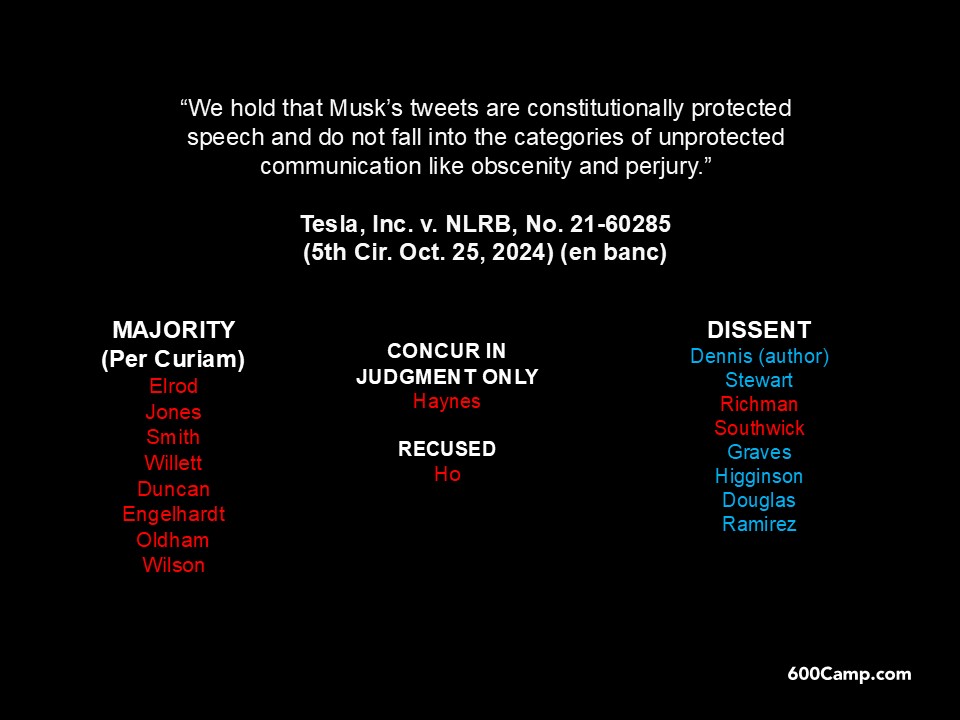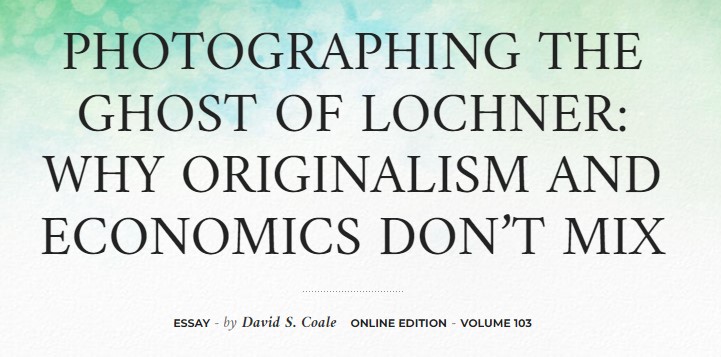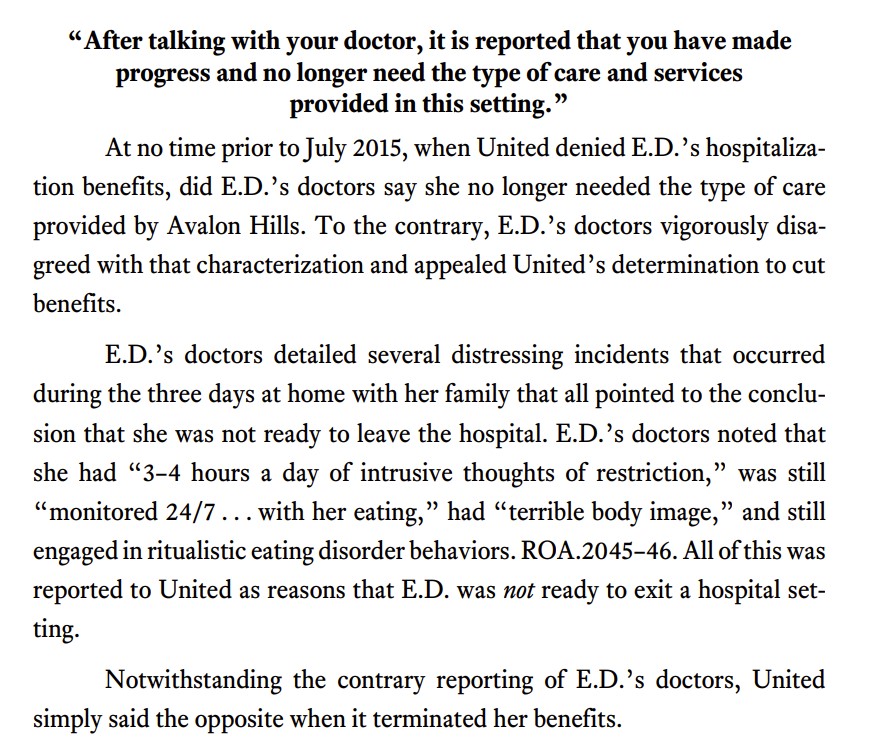 Repub. Nat’l Comm. v. Wetzel held that a Mississippi statute, allowing absentee ballots to be received up to five days after Election Day, is preempted by federal law, which mandates that all ballots must be received by Election Day. The court emphasized that the term “Election Day” refers to a singular day. Slate’s Mark Stern offers some provocative commentary about the potential impact – or lack thereof – of this ruling. No. 24-60395, Oct. 25, 2024.
Repub. Nat’l Comm. v. Wetzel held that a Mississippi statute, allowing absentee ballots to be received up to five days after Election Day, is preempted by federal law, which mandates that all ballots must be received by Election Day. The court emphasized that the term “Election Day” refers to a singular day. Slate’s Mark Stern offers some provocative commentary about the potential impact – or lack thereof – of this ruling. No. 24-60395, Oct. 25, 2024.
Monthly Archives: October 2024
In a per curiam opinion joined by eight judges, the Fifth Circuit held in Tesla v. NLRB that an NLRB decision about unfair labor practices by Tesla would be vacated and remanded for further proceedings:
We hold that Musk’s tweets are constitutionally protected speech and do not fall into the categories of unprotected communication like obscenity and perjury. And the Board does not dispute the general rule that it (like every other part of the Government) is powerless to delete protected speech.
But nine other judges didn’t join that opinion. As detailed below, Judge Haynes concurred in the judgment only, and eight judges joined a dissent. So what the NLRB is supposed to do on remand is not entirely clear.
Crosswell v. Rodriguez involved the sufficiency of a RICO pleading. The Fifth Circuit emphasized a RICO enterprise “must exist for purposes other than just to commit predicate acts,” which means that “accusing a group of defendants comprising one natural person and a collection of legal fictions as undertaking a set of acts together, without providing any detail as to how they acted together, fails to provide a factual basis from which to plausibly infer the connected structure of an association.”
Here, while the plaintiffs’ allegations described a stand-alone set of events, the Court held that no allegations plausibly supported the theory that these transactions were part of a repeated and continuing scheme involving the defendants. No. 23-20535, Oct. 17, 2024.
 In X Corp. v. Media Matters for Am., the Fifth Circuit granted a stay pending appeal of a a district court’s discovery order compelling Media Matters to disclose its donor information, citing First Amendment concerns.
In X Corp. v. Media Matters for Am., the Fifth Circuit granted a stay pending appeal of a a district court’s discovery order compelling Media Matters to disclose its donor information, citing First Amendment concerns.
The Court emphasized the loss of First Amendment freedoms, even for minimal periods, constitutes irreparable injury, and that the public interest is better served by avoiding the risk of a chilling effect on association, as “First Amendment freedoms need breathing space to survive.” The Court also noted the breadth of the discovery requests, proportionate to the needs of the case, and the risk that disclosure of the requested information could lead to harassment or intimidation of Media Matters and its donors. No. 24-10900, Oct. 20, 2024.
 In Ultra Deep Picasso Pte. Ltd. v. Dynamic Indus., the Fifth Circuit addressed the critical issue of where a bank account can be garnished in an “in rem” proceeding grounded in admiralty law. Applying the general principle that the property must be found within the district where the trial court is located, the Fifth Circuit concluded that a bank account is located where its funds can be withdrawn — a standard that requires the physical presence of the bank or its branches within the district.
In Ultra Deep Picasso Pte. Ltd. v. Dynamic Indus., the Fifth Circuit addressed the critical issue of where a bank account can be garnished in an “in rem” proceeding grounded in admiralty law. Applying the general principle that the property must be found within the district where the trial court is located, the Fifth Circuit concluded that a bank account is located where its funds can be withdrawn — a standard that requires the physical presence of the bank or its branches within the district.
The court rejected the argument that it’s enough to have jurisdiction in the district over the garnishee bank. In rem jurisdiction “rests on the attaching court’s jurisdiction over both the garnishee and the property to be attached.” Because the garnishee bank didn’t have a branch in the district, but only a “representative office” with limited authority, the garnishment failed. No. 23-20357, Oct. 18, 2024.
 Last week I touched on one significant copyright holding from UMG Recordings v. Grande Communications Networks. In that case, the Fifth Circuit also addressed the calculation of statutory damages under the Copyright Act.
Last week I touched on one significant copyright holding from UMG Recordings v. Grande Communications Networks. In that case, the Fifth Circuit also addressed the calculation of statutory damages under the Copyright Act.
Specifically, the Court held that statutory damages should be awarded per compilation (e.g., an album) rather than per individual work within the compilation. The court emphasized that the plain language of the Copyright Act mandates that “all the parts of a compilation or derivative work constitute one work” for the purposes of statutory damages.
This conclusion means that when multiple songs from the same album are infringed, the copyright owner is entitled to only one statutory damage award for the entire album, not separate awards for each song. The Court rejected the district court’s approach, which allowed separate statutory damages for each individual song. In so doing, the Fifth Circuit noted that many of the works in question were registered as compilations, with certificates of registration indicating notations such as “collective work” or “compilation of sound recordings.” No. 23-50162, Oct. 9, 2024.
 In UMG Recordings v. Grande Communications Networks, the Fifth Circuit held that an internet service provider materially contributed to copyright infringement, by continuing to provide internet services to known infringing subscribers, without taking basic measures to prevent further infringement. As potential safety measures, the Court noted that the ISP could have terminated the accounts of repeat infringers (a measure that Grande had previously employed) or required infringing subscribers to contact the company to maintain their services No. 23-50162, Oct. 9, 2024.
In UMG Recordings v. Grande Communications Networks, the Fifth Circuit held that an internet service provider materially contributed to copyright infringement, by continuing to provide internet services to known infringing subscribers, without taking basic measures to prevent further infringement. As potential safety measures, the Court noted that the ISP could have terminated the accounts of repeat infringers (a measure that Grande had previously employed) or required infringing subscribers to contact the company to maintain their services No. 23-50162, Oct. 9, 2024.
 In La Union del Pueblo Entero v. Abbott, the Fifth Circuit stayed an injunction against a Texas election law, emphasizing that the injunction was issued just three weeks before voting was set to begin–and after Texas had already started issuing mail-in ballots for the 2024 general election. A concurrence focused solely on the issue of timing and did not address the merits issues that the panel majority also reviewed. No. 24-50783, Oct. 15, 2024.
In La Union del Pueblo Entero v. Abbott, the Fifth Circuit stayed an injunction against a Texas election law, emphasizing that the injunction was issued just three weeks before voting was set to begin–and after Texas had already started issuing mail-in ballots for the 2024 general election. A concurrence focused solely on the issue of timing and did not address the merits issues that the panel majority also reviewed. No. 24-50783, Oct. 15, 2024.
 The 2008 financial crisis produced a bumper crop of Fifth Circut opinions about basic issues involving home loans, because diversity jurisdiction drove much of that litigation into the federal courts. While (thankfully) there are far fewer cases about those issues now, the Fifth Circuit still writes in that important area, most recently in Couch v. Bank of New York Mellon, holding:
The 2008 financial crisis produced a bumper crop of Fifth Circut opinions about basic issues involving home loans, because diversity jurisdiction drove much of that litigation into the federal courts. While (thankfully) there are far fewer cases about those issues now, the Fifth Circuit still writes in that important area, most recently in Couch v. Bank of New York Mellon, holding:
- Clock for foreclosure. “The Couches contend that [CPRC] § 16.025(a) and (b) require mortgagees to file suit and sell within four years to preserve the lien. Texas courts disagree. Section 16.035(a) ‘does not require that the actual foreclosure occur within the four-year limitation period, but rather, requires only that the party seeking foreclosure “bring suit … not later than four years after the day the cause of action accrues.”‘”
- Clock for adverse possession. “[T]he adverse possession clock did not start until the Bank acquired the property at the constable’s sale. The Couches have not adversely possessed the property for a sufficient period of time under any of the potentially applicable periods.”
No. 24-10297 (Oct. 11, 2024, unpublished).
 The Fifth Circuit said “enough” as to a district court’s aggressive oversight of the Texas foster-care system, vacating a contempt order and requiring reassignment of the case on remand. Capturing the flavor of the opinion, towards the end of the section on reassignment, the Court said:
The Fifth Circuit said “enough” as to a district court’s aggressive oversight of the Texas foster-care system, vacating a contempt order and requiring reassignment of the case on remand. Capturing the flavor of the opinion, towards the end of the section on reassignment, the Court said:
However, as a general rule of law federal judges are not allowed to become permanent de facto superintendents of major state agencies. Horne v. Flores, 557 U.S. 433, 453, 129 S. Ct. 2579, 2597 (2009) (“[T]he longer an injunction or consent decree stays in place, the greater the risk that it will improperly interfere with a State’s democratic processes.”); United States v. Mississippi, 82 F.4th 387, 400 (5th Cir. 2023) (“Micromanagement, enforced upon threat of contempt, does not reflect the principles of comity” in prison context.). Nor, under the federalist structure created by the Constitution, is it appropriate for federal court intervention to thwart the state’s self-management, where the state is taking strides to eliminate the abuses that led to the original decree. Horne, 557 U.S. at 448, 129 S. Ct. at 2593–94 (“Federalism concerns are heightened” where “a federal court decree has the effect of dictating state . . . budget priorities.”). Nor are federal judges even suited, by training or temperament, to manage institutions, personnel, or the provision of vital state services, even if counselled by monitors.
M.D. v. Abbott, No. 24-40248 (Oct. 11, 2024).
 In RSM Prod. Corp. v. Gaz du Cameroun, S.A., the Fifth Circuit reversed the district court’s decision to vacate a revised arbitral award that reduced the damages awarded from $10.5 million to $6.5 million. The Court held that the arbitral tribunal had the authority to correct “computational errors” in its initial award and to determine what constituted such errors under the International Chamber of Commerce Rules, which the parties’ agreements incorporated. Applying the highly deferential standard of review for such issues, the Court held that the tribunal “arguably construed the parties’ contracts” when it issued the corrected award, even if it made a mistake in its interpretation.
In RSM Prod. Corp. v. Gaz du Cameroun, S.A., the Fifth Circuit reversed the district court’s decision to vacate a revised arbitral award that reduced the damages awarded from $10.5 million to $6.5 million. The Court held that the arbitral tribunal had the authority to correct “computational errors” in its initial award and to determine what constituted such errors under the International Chamber of Commerce Rules, which the parties’ agreements incorporated. Applying the highly deferential standard of review for such issues, the Court held that the tribunal “arguably construed the parties’ contracts” when it issued the corrected award, even if it made a mistake in its interpretation.
The Court rejected RSM’s argument that the tribunal exceeded its powers by reconsidering the merits of RSM’s claims. Distinguishing RSM’s authority, the Court noted that the ICC rules allowed this tribunal to correct any “clerical, computational or typographical error, or any errors of similar nature contained in [the] award.” The Court emphasized that “[t]he potential for … mistakes is the price of agreeing to arbitration” and that “[t]he arbitrator’s construction holds, however good, bad, or ugly.” No. 23-20583, Sept. 19, 2024.
Quoted in a provocative new article in Mother Jones about the Fifth Circuit, I point out that it’s the venue of choice these days for administrative-law disputes.
 Hon. Jennifer Walker Elrod has taken office as the new Chief Judge of the Fifth Circuit, succeeding Hon. Priscilla Richman. The Texas Lawbook has a good story on this “changing of the guard” for this critical leadership role. The new Chief tells the Lawbook:
Hon. Jennifer Walker Elrod has taken office as the new Chief Judge of the Fifth Circuit, succeeding Hon. Priscilla Richman. The Texas Lawbook has a good story on this “changing of the guard” for this critical leadership role. The new Chief tells the Lawbook:
“I believe that we are all in this endeavor together to uphold our Constitution and try to follow the rule of law and this enterprise works best when everyone gets to participate and have their say … And we can learn from each other if we’re all at liberty to engage. … I also believe iron sharpens iron … by learning what others who think differently believe, and what the basis for that belief is, that can help you to better reinforce your view, or perhaps, to change your mind.”
 Cure & Assocs., P.C. v. LP Fin., LLC addreses whether nonsignatories to an arbitration agreement can be compelled to arbitrate under state-law equitable estoppel principles. The Fifth Circuit held that these nonsignatories could be compelled, because they received direct benefits from the contractual relationship between the two signatories. Specifically, the Court noted that one of the nonsignatories was formed specifically to facilitate one signatory’s business with the other, sharing clients, employees, and office space. Under both California and Texas law, a nonsignatory can be compelled to arbitrate if it “deliberately seeks and obtains substantial benefits from the contract” with an arbitration clause. No. 23-40519, Oct. 1, 2024.
Cure & Assocs., P.C. v. LP Fin., LLC addreses whether nonsignatories to an arbitration agreement can be compelled to arbitrate under state-law equitable estoppel principles. The Fifth Circuit held that these nonsignatories could be compelled, because they received direct benefits from the contractual relationship between the two signatories. Specifically, the Court noted that one of the nonsignatories was formed specifically to facilitate one signatory’s business with the other, sharing clients, employees, and office space. Under both California and Texas law, a nonsignatory can be compelled to arbitrate if it “deliberately seeks and obtains substantial benefits from the contract” with an arbitration clause. No. 23-40519, Oct. 1, 2024.
If you enjoyed my article in the Cornell Law Review Online earlier this year about the party-presentation principle, hopefully you will also enjoy a new article of mine in the Texas Law Review Online. Examining cases from the 2023-24 Supreme Court term, it considers whether “originalism” and modern economic theory can comfortably coexist.
Dwyer v. United Healthcare Ins. Co., No. 23-50439 (Sept. 19, 2024), vitalizes the technical and often defense-favoring framework of ERISA benefits litigation, challenging virtually all material points–factual and legal–put forward by a plan adminstrator in its handling of claims relating to a serious anorexia case. On the facts, the opinion proceeded as follows, pointing out numerous inconsistencies between what the administrator contended and what the record, in fact, showed:
Unsurprisingly, given all three judges’ discomfort with the Fifth Circuit precedent that dictated the panel holding in Abraham Watkins v. Festeryga, that case will be considered by the en banc court. The issue, as summarized by the panel majority, is this:
Edward Festeryga, an attorney embroiled in a dispute with his former law firm, wants this case heard in federal court and contends we have appellate jurisdiction over the district court’s remand order because waiver is neither an issue of subject-matter jurisdiction nor a defect in removal procedure under 28 U.S.C. § 1447(c). We agree, but our 40-plus-year-old precedent provides otherwise, holding that a waiver-based remand order is jurisdictional under § 1447(c) and thus unappealable under § 1447(d).
While no longer in the academy, the capable Rory Ryan offered this insightful analysis of this case on X.



